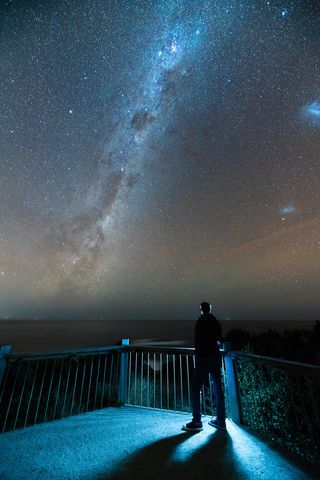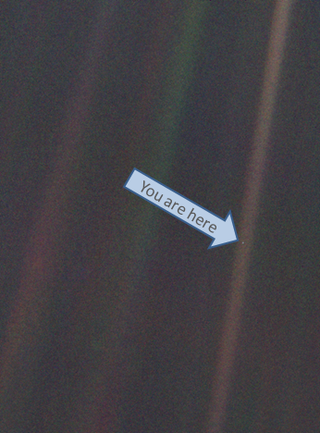Ethics and Morality
Does the Universe Have a Purpose?
Why we insist it does, and why it's okay that it most probably doesn't.
Posted May 6, 2019 Reviewed by Lybi Ma

“Does the Universe Have a Purpose? I hope so." —Elie Wiesel1
People ask: “Does the universe have a purpose?” But they're really asking: “Is there a higher power that created everything, including me, for a higher purpose?” People worry that if the universe doesn’t have a purpose, neither do we.
Belief in a purposeful universe is pervasive, and not just among conventional religious believers. It’s a belief also typically shared by “spiritual but not religious” people who may not even believe in the kind of god with whom one can have a personal relationship.
The seeming improbability of a spontaneous, unguided universe2
There are even some very reputable scientists with strong religious or spiritual beliefs in a higher power and higher purpose (though the great majority of top scientists today are non-believers). One of the most famous exemplars is Francis Collins, director of the National Institutes of Health (NIH), and previously the leader of the Human Genome Project, who has explained:
I had to admit that the science I loved so much was powerless to answer questions such as "What is the meaning of life?" "Why am I here?" "Why does mathematics work, anyway?" "If the universe had a beginning, who created it?" "Why are the physical constants in the universe so finely tuned to allow the possibility of complex life forms?" "Why do humans have a moral sense?" "What happens after we die?"3
As a young man, overcome with awe by the site of a magnificent frozen waterfall while hiking, Collins “knelt in the dewy grass as the sun rose and surrendered to Jesus Christ.”4 The frozen waterfall was divided into three streams, which for him represented the Holy Trinity.
To be sure, for many deep thinkers there have been quite sound and intelligent reasons for believing that the universe was designed and created by a higher power with a higher purpose. Until fairly recent times, it was hard to fully explain in purely scientific terms how the immense complexity of the world could have arisen entirely spontaneously and unguided. And, as Collins put it, why the laws of physics appear fine-tuned.
Stephen Hawking, in his 1988 bestseller A Brief History of Time, was one of the first scientists to draw popular attention to the fine-tuning enigma:
The laws of science, as we know them at present, contain many fundamental numbers, like the size of the electric charge of the electron and the ratio of the masses of the proton and the electron . . . . The remarkable fact is that the values of these numbers seem to have been very finely adjusted to make possible the development of life.5
A spontaneous, unguided universe is in fact fully plausible
But Hawking also came up with natural explanations for the fine-tuning enigma, as have many physicists and cosmologists (among others, the respected physicist and philosopher Victor Stenger wrote several popular science books on the subject).6
In the realm of biology, 160 years of extensively detailed science in evolutionary biology since Darwin published On the Origin of Species has left no doubt that the complexity of living organisms, including Homo sapiens, could indeed have arisen without even a whiff of prior purpose or design.7 Moreover, biological evolution (which is far better understood than the origins of the universe) is utterly incompatible with any kind of foresight or planning. Sure, it’s still possible to believe that a higher power with a higher purpose operates surreptitiously behind it all, using evolution as a means to creation, making it all just appear spontaneous and unguided. But given everything we now know about how evolution proceeds, a god who uses evolution to create living creatures can only be thoroughly cruel or indifferent, as well as inefficient, tinkering, and bungling. So even if one bought into the notion that a deity fine-tuned the universe, such a god self-evidently has little regard for the well-being of living creatures including us, and there is abundant evidence for lack of benevolence.8
What about the mystery of consciousness? Does it point to a supernatural designer and a spiritual realm? At first consideration, consciousness seems especially enigmatic and impossible to explain in its complexity and its nonmaterial quality. The field of neuroscience is at a much earlier stage of development than evolutionary biology (though it’s advancing in leaps and bounds), but neuroscientists see no rational reason to believe that evolution stops at the neck and to invoke mysticism in explaining the mind-brain question. We already have some inkling into how something as complex as the human mind and the subjective conscious self-awareness it produces can indeed be the product of blind unguided evolution from mere matter (as I have described in several previous blog posts9).
Values in a purposeless universe
Another question that stumps many people is how to explain or anchor values and ethics in a material, unguided universe. Many do not understand how morality could have emerged and evolved at all, or at least in a coherent manner, in a universe without a higher power and higher purpose. They erroneously assume and fear that human societies in a purposeless universe would be devoid of purpose, meaning, and morality. I have written about this elsewhere (see 10).
In actual fact, for a variety of reasons, the less strong a society’s belief in a higher power and higher purpose is, the more cooperatively interdependent it tends to be. Highly secular democracies are far ahead of nations of religious believers on the path toward creating more peaceful, compassionate and flourishing societies.
Our human brains are predisposed to believe that the universe has a purpose
“Frankly, I am psychologically incapable of believing that the universe is meaningless.” —Owen Gingerich, Professor Emeritus of Astronomy and of the History of Science at Harvard University11
The assumption that there must be some sort of higher purpose to life and the universe fits with an intuitive human tendency to think that “everything happens for a reason” (and it’s all about us). This intuition derives from our being intentional agents. We usually have reasons for the things we do, and we assume that others do too. We are exquisitely adept at perceiving agency and intention in other living creatures. We evolved this way to detect predators and prey and to cooperate with other humans. We infer intention so adeptly that we have a habit of over-attributing agency or purpose even to inanimate objects and random natural occurrences. Our intentional stance leads us to believe that the universe itself has a purpose, inferring it to be the product of a deliberate, creative designing agent—an agent just like us, only immensely more powerful. This also fits with our natural tendency as social animals to defer to higher authorities like parents and leaders and to seek direction for how we should live our lives.
Our human sense of purpose is not dependent on the universe having a purpose
The universe is highly unlikely to have a purpose, but humans have evolved to be highly purpose-driven. Our human sense of purpose is neither derived from nor dependent on the universe having a purpose.
Once we get over our childlike wish to be told what “the” purpose and meaning of life is, we see that meaning is something that we make, not made for us. There are many meanings of life that we make for ourselves, and we discover that we have evolved the capacity to do so very proficiently despite the universe being fundamentally random. We accept that the responsibility to define purpose, meaning, and morality is all ours; it is not handed down to us from on high.
Underscoring our responsibility to deal more kindly with one another
Carl Sagan said it best, reflecting on the significance of a photograph of planet Earth taken on February 14, 1990, by the Voyager 1 space probe from about 6 billion kilometers away. Our planet appeared in the photograph as a tiny distant pale blue pixel against a reflected band of sunlight. The picture famously became known as the Pale Blue Dot. Here's Sagan:

Look again at that dot. That's here. That's home. That's us. On it everyone you love, everyone you know, everyone you ever heard of, every human being who ever was, lived out their lives . . . . Our posturings, our imagined self-importance, the delusion that we have some privileged position in the Universe, are challenged by this point of pale light . . . . There is perhaps no better demonstration of the folly of human conceits than this distant image of our tiny world. To me, it underscores our responsibility to deal more kindly with one another and to preserve and cherish the pale blue dot, the only home we've ever known.
References
1. Wiesel was answering one of The John Templeton Foundation’s Big Questions (series) posed to leading scientists and scholars: “Does the Universe Have a Purpose?”
2. Parts of this article are taken from: Ralph Lewis, Finding Purpose in a Godless World: Why We Care Even If The Universe Doesn’t (Amherst, NY: Prometheus Books, 2018). The book is a deeper dive into questions of purpose, meaning and morality in a random, purposeless, godless universe.
See this YouTube video link for an engaging Power Point presentation in which Dr. Lewis explains how a family health crisis focused him on coming to terms with the outsized role of randomness in life, and to wrestle with the question of whether the scientific worldview of a fundamentally random universe is nihilistic. He summarizes how science has come to view the universe and absolutely everything in it as the product of entirely spontaneous, unguided processes, and why this is actually a highly motivating realization for humankind. Or see this link for a very brief video providing a synopsis of the book.
3. http://www.cnn.com/2007/US/04/03/collins.commentary/index.html. [CLICK 'MORE' TO VIEW FOOTNOTES 4-11]
4. Francis Collins, The Language of God: A Scientist Presents Evidence for Belief (New York, NY: Free Press, 2006), p. 22.
5. Stephen. W. Hawking, A Brief History of Time: From the Big Bang to Black Holes (New York: Bantam Books, 1988), p. 7, 125.
6. E.g. Victor Strenger, The Fallacy of Fine-Tuning: Why the Universe Is Not Designed for Us (Amherst, NY: Prometheus Books, 2011).
7. Notwithstanding the tireless attempts by Intelligent Design proponents such as Michael Behe to suggest otherwise. For just one thorough refutation of Behe’s arguments see here.
8. On the other hand, perhaps God’s perception of time is just different from ours? We complain of terrible suffering, and he appears to us incompetent or cruel or indifferent. But maybe that’s just from our narrow point of view—perhaps we lack his long view of time and his understanding of the higher plan? It will all make sense in the after-life… Theologians offer this belief for your comfort if you’ve suffered cruel adversity. Decide for yourself if you can buy into it.
9. The Physical Evolution of Consciousness; Do You Have Free Will?; How Could Mind Emerge From Mindless Matter?; What Actually Is a Thought? And How Is Information Physical?; Where Does Purpose Come From? (If the Universe Had None); Is There Life After Death? The Mind-Body Problem. And for a more in depth understanding of the nature of consciousness and how it evolved, see my five-part blog series: "What Actually Is Consciousness, and How Did It Evolve?" (Part 1 of 5).
10. Ralph Lewis, Finding Purpose in a Godless World: Why We Care Even If The Universe Doesn’t (Amherst, NY: Prometheus Books, 2018).
11. In answering “Yes” to the Templeton Foundation’s question “Does the Universe Have a Purpose?”




